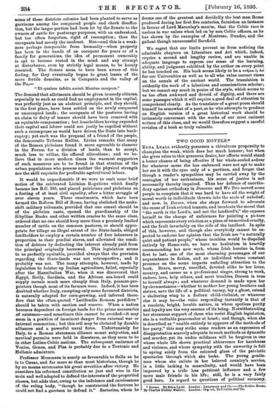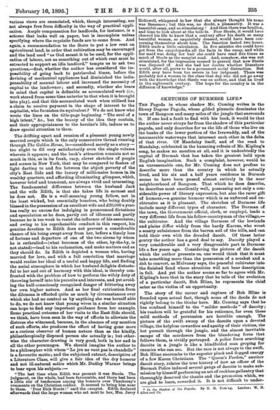TWO GOOD NOVELS.*
EDNA LYALL evidently possesses a chivalrous propensity to champion the weak, which does her much honour; but when she gives reins to this generous desire, her efforts would stand a better chance of being effective if her whole-souled ardour for whatever cause she has embraced were not apt to make her see it with the eyes only of a partisan, and forget that though a reader's sympathies may be carried away by the contagion of her enthusiasm, his sense of justice is not necessarily thereby impaired. Thus her defence of unortho- doxy against orthodoxy in Donovan and We Two moved some people to complain that it was hard to have all the weight of moral worth in individuals thrown into the scale of unbelief; and now, in Doreen, when she steps forward to advocate the cause of Irish evicted tenants, and inculcate the moral that "the earth is the Lord's, and not the landlord's," she exposes herself to the charge of unfairness for painting a picture which represents every eviction as a piece of unmerited cruelty, and the fault invariably on the side of the landlord. In spite of this, however, and though also everybody cannot be ex- pected to endorse her opinion that the Irish are "a naturally quiet and patient people," whose troubles would be dispelled entirely by Home-rule, we have no hesitation in heartily recommending her new work, whose Irish heroine is, from first to last, one of the most charming personages of our acquaintance in fiction, and an individual whose constant presence on the scene imparts unfailing attraction to the book. Brave, merry, unselfish, devoted alike to her lover, country, and career as a professional singer, strong to work, endure, love, help others, and meet troubles, Doreen is true to herself always ; and whatever demand is made upon her by circumstances—whether to mother her young brothers and sisters, save the life of a political enemy, lay a ghost, extend a sheltering wing to a forlorn child-violinist, or whatever else it may be—the voice responding instantly is that of a resolute, bright, lovable nature, in whom spotless purity and loyalty are the very essence of its being. Notwithstanding her strenuous support of those who resist English legislation, she is a veritable peacemaker at heart; and though, when she is described as "unable entirely to approve of the methods of her party," this may strike some readers as an expression of disapprobation scarcely adequate to such methods as dynamite and murder, yet its undue mildness will be forgiven in one whose whole life shows practical abhorrence for harshness and violence, and whose sympathy with the unworthy is felt to spring solely from the coloured glass of the patriotic spectacles through which she looks. The young gentle- man whom she enlists in her beloved country's service, is a little lacking in masculinity, and would have been improved by a trifle less petticoat influence and a few more male friends in his life ; still, he is a very fairly good hero. In regard to questions of political economy, • Doreen. By Edna Lyall. London : Langres= and Co.—The Golden House. By Charles Dudley Warner. London: Osgood. IdcIlvaine, and Co.
various views are enunciated, which, though interesting, are not always free from difficulty in the way of practical appli- cation. Ample compensation for landlords, for instance, is a scheme that looks well on paper, but is incomplete unless specifying where the requisite funds are to come from. And again, a recommendation to the State to put a low rent on agricultural land, in order that cultivation may be encouraged and the land used "as God meant it to be used, for the appli- cation of labour, not as something out of which rent must be extracted to support an idle landlord," tempts us to ask two questions,—first, whether the author has considered the im- possibility of going back to patriarchal times, before the devising of mechanical appliances had diminished the indis- pensability of manual labour and increased the necessity of capital to the landowner ; and secondly, whether she bears in mind that capital is definable as accumulated work (i.e., work stored from some time anterior to that when it is brought into play), and that this accumulated work when utilised has a claim to receive payment in the shape of interest to the capitalist, who furnishes its equivalent ? We do not know who wrote the lines on the title-page beginning "The soul of a high intent," Stc., but the beauty of the idea they contain, and their appropriateness to the heroine's life, induce us to draw special attention to them.
The drifting apart and reunion of a pleasant young newly married couple which is the only consecutive thread running through The Golden House, is—considered merely as a story — too slight to fill very satisfactorily even the single volume wherein it appears ; and the book's attraction consists not so much in this, as in its fresh, racy, clever sketches of people and scenes in New York, that may be compared to flashes of light darting to and fro between the abject poverty of the city's East Side and the luxury of millionaire homes in its wealthy quarters, and affording illuminating glimpses, which, however brief and transient, are always vivid and interesting. The fundamental difference between the husband Jack and the wife Edith, is that she takes life in earnest and he does not. He is a well-meaning young fellow, not in the least wicked, but essentially boneless, who being doubly blessed in the possession of an excellent wife and £20,000 a year, has really no excuse for indulging in pronounced flirtations and speculation as he does, partly out of idleness and partly because he is too weak to resist the influence of his associates ; and owing to his reprehensible conduct in this respect, his genuine devotion to Edith does not prevent a considerable chance of his being swept away from her, before a timely loss of fortune and departure of one of the two sirens by whom he is enthralled—(what becomes of the other, by-the-by, is not stated)—lead to his reclamation, and make matters end as they should do. In Edith is depicted a woman who, having married for love, and with a full conviction that marriage would realise her ideal of a useful and happy life, and finding the social atmosphere in which her husband delights distaste- ful to her and out of harmony with this ideal, is thereby con- fronted with the problem of how to perform the wifely duty of throwing herself into his pursuits and interests, and yet avoid- ing the half-consciously recognised danger of frittering away her own higher nature. And as her final extrication from
the dilemma is effected quite HE much by circumstances over which she had no control as by anything she was herself able to do, we do not know that young wives in a similar situation can hope to find any important guidance from her example. Some practical outcome of her visits to the East Side should,
we think, have been seen in the way of efforts to alleviate the distress she witnessed, because, in the absence of any mention of such efforts, she produces the effect of having gone more as a curious observer of human nature than as the kindly, philanthropically disposed person she actually is ; but other- wise the character-drawing is very good, both in her and in all the other personages. We should imagine the author to be a philosopher with whom "Le jeu ne vaut pas la chandelle" is a favourite motto ; and the subjoined extract, descriptive of a Literature Class, will give a fair idea of the dry humour and not ill-natured satire which Mr. Dudley Warner brings to bear upon his subjects :—
" The last time when Edith was present it was Steele. The judgment, on the whole, had been favourable, and there had been a little stir of tenderness among the bonnets over Thackeray's comments on the Christian soldier. It seemed to bring him near to them. 'Poor Dick Steele !' said the essayist Edith declared afterwards that the large woman who sat next to her, Mrs. Jerry
Hollowell, whispered to her that she always thought his name was Bessemer ; but this was, no doubt, a pleasantry. It was a beautiful essay, and so stimulating ! And then there was bouillon, and time to look about at the toilets. Poor Steele, it would base cheered his life to know that a century after his death so many beautiful women, so exquisitely dressed, would have been con- cerning themselves about him. The function lasted two hours. Edith made a little calculation. In five minutes she could have got from the encyclopiedia all the facts in the essay, and while her maid was doing her hair she could have read five times as much of Steele as the essayist read. And, somehow, she was not stimulated, for the impression seemed to prevail that now Steele was disposed of. And she had her doubts whether literature would, after all, prove to be a permanent social distraction. Bat Edith may have been too severe in her judgment. There was probably not a woman in the class that day who did not go away with the knowledge that Steele was an author, and that he lived in the eighteenth century. The hope for the country is in the diffusion of knowledge."



































 Previous page
Previous page